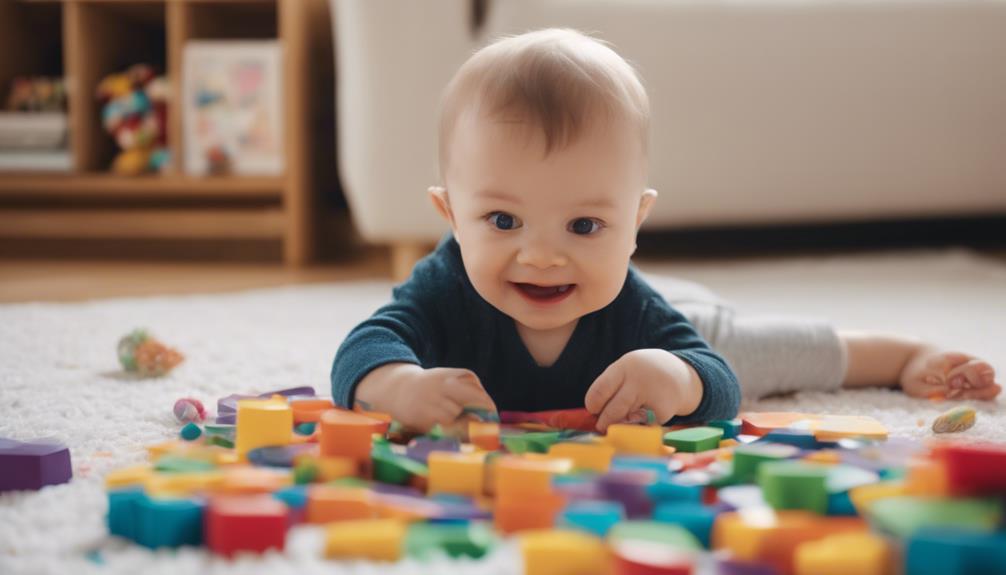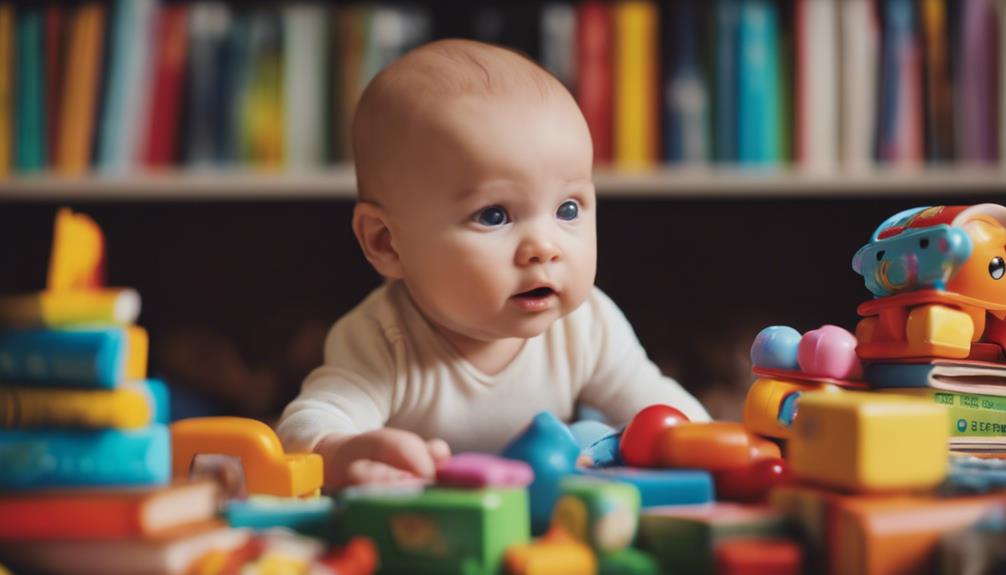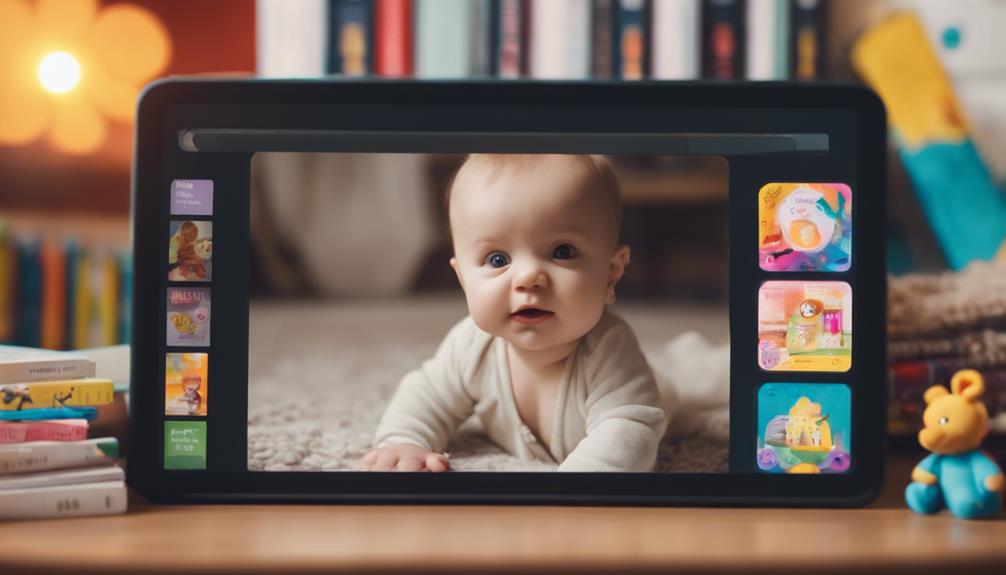Start the My Baby Can Read program when your baby is about three months old to promote optimal language development and early learning. Introduce interactive sentences, word games, and lift-the-flap books to improve vocabulary and cognitive skills. Engage your baby in reading sessions every day and incorporate multi-sensory tools for active participation. Parental involvement is crucial for success, as regular interactions support language acquisition and literacy skills. Be patient and consistent to create a positive learning environment. Keep a close eye on progress and adjust based on your baby’s developmental stage to ensure effective learning. For additional guidance on getting started with the program, continue exploring essential support systems and age-appropriate techniques.
Key Takeaways
- Initiate the program around 3 months for optimal language development.
- Early start fosters reading skills foundation.
- Daily hour-long sessions enhance early literacy.
- Look for signs of readiness like sustained attention.
- Tailor the program based on developmental stage.
Benefits of Starting Early
Starting the My Baby Can Read program early, around 3 months of age, can greatly benefit your infant's language development. Early Learning is vital in shaping your baby's cognitive abilities, and introducing reading at a young age can have a profound impact. By engaging with educational materials tailored for infants, you can Make learning fun and interactive, setting the stage for a lifelong love of reading.
Research shows that early exposure to reading can lead to improved vocabulary, attention span, and word recognition in babies. According to the American Academy of Pediatrics, 'reading to infants can enhance language acquisition and literacy skills.'
The My Baby Can Read program encourages parent-child interaction, fostering early word learning and recognition.
Developmental Milestones for Starting

To determine if your baby is ready to begin the My Baby Can Read program, observe their responses to visual and auditory stimuli, such as showing interest in images and making eye contact.
Babies and toddlers are able to sound out simple syllables and words at around 3 months old, which is an important milestone indicating readiness for the program.
According to the My Baby Can Read program, early exposure to reading can greatly enhance language development and vocabulary acquisition in infants.
Developmental milestones for starting also include responding to sounds by turning their head or making vocalizations in response to stimuli.
By capitalizing on the brain's early developmental stages, the program aims to foster a love for reading and learning in young children.
If your baby is displaying these developmental cues, they may be ready to embark on the journey of learning to read with the My Baby Can Read program.
Program Materials and Resources

Are program materials and resources essential for the My Baby Can Read program?
Yes, they play a vital role in enhancing your child's learning experience. The program provides interactive sentences, word games, and noun word cards to make learning engaging and fun. Additionally, the inclusion of lift-the-flap books with audio in multiple languages ensures a multi-sensory approach to learning. Translation lists and digital books with audio further enrich the learning process, making it more accessible and engaging for your child.
One of the key resources in the program is the Sliding Word Cards, which help in building vocabulary and word recognition skills. These cards allow for interactive learning, promoting active participation from your child.
The program also offers strategies to encourage repetition and participation, fostering a strong foundation for language development.
Setting a Strong Foundation

Program materials and resources provide the necessary tools for setting a strong foundation in early literacy skills through interactive sessions and engaging activities for babies and toddlers. Learning through the My Baby Can Read program involves various strategies aimed at making the process enjoyable and effective. Here is a breakdown of some key components that contribute to building a solid literacy base for your child:
| Learning Component | Description | Benefit |
|---|---|---|
| Interactive Sessions | Daily sessions encourage language development through engagement with interactive materials. | Enhances communication skills and vocabulary. |
| Lift-the-Flap Books | These books with audio in multiple languages offer a fun way to introduce reading to young children. | Encourages curiosity and early reading habits. |
| Word Games | Interactive sentences and noun word cards help in enhancing the learning experience. | Improves word recognition and cognitive skills. |
| Child Participation | Strategies focus on encouraging child involvement, repetition, and word recognition. | Fosters active engagement and retention. |
Age-Appropriate Learning Techniques

Begin incorporating age-appropriate learning techniques early in your baby's development to foster literacy skills effectively. The My Baby Can Read program suggests starting at around 3 months of age to optimize learning.
Utilizing strategies like interactive sentences, word games, and lift-the-flap books with audio can aid in early literacy development for babies and toddlers. The program emphasizes engaging activities to teach children how to read.
Parents can encourage child participation by incorporating repetition and multi-sensory tools into the learning process. According to the program, interactive sentences play an essential role in teaching babies how to read.
Encouraging Language and Cognitive Skills

Encouraging your baby's language and cognitive skills early on can have a significant impact on their development. Teaching your child through interactive methods, such as the My Baby Can Read program, can foster a strong foundation for early language development.
Here are five key ways to promote language and cognitive skills in your baby:
- Engage in daily reading sessions with your child to enhance vocabulary and word recognition.
- Utilize interactive tools and activities to make learning fun and engaging for your baby.
- Talk to your baby regularly to encourage language development and communication skills.
- Sing songs and recite rhymes to expose your child to different sounds and patterns of speech.
- Provide a stimulating environment with educational toys and books to support cognitive development.
Gradual Learning and Absorption

For effective learning and retention, gradually exposing your baby to reading materials and activities is key. The My Baby Can Read program emphasizes the importance of introducing your baby to reading at an early age to enhance language development and cognitive skills.
By starting the program around 3 months of age, your baby can begin to absorb information through consistent exposure to reading materials. According to the program, 'gradual learning is essential for your baby's journey towards becoming a proficient reader.'
Through gradual exposure to reading materials, your baby can develop a strong foundation for language and cognitive skills. The program highlights that 'babies are like sponges, absorbing information from their surroundings.'
Consistent Exposure to Program

Initiating the My Baby Can Read program early, around 3 months of age, is vital for building a strong foundation in reading skills.
Consistent exposure to the program through daily hour-long sessions not only familiarizes infants with language patterns but also enhances their early literacy development.
Program Exposure Importance
Consistent exposure to the My Baby Can Read program is essential for maximizing learning outcomes. To fully harness the benefits of the program, consider the following:
- Baby Can Learn: Starting the program around 3 months of age allows for early brain development and language acquisition.
- Child Can Read: Regular daily sessions of approximately one hour are recommended for effective results.
- Word Recognition: The program focuses on enhancing word recognition skills.
- Vocabulary Growth: It aids in expanding your child's vocabulary.
- Repetition Reinforcement: Encouraging participation and repetition helps reinforce learning and retention for young children.
Early Learning Benefits
Begin your baby's journey to enhanced early learning benefits by ensuring consistent exposure to the My Baby Can Read program from as early as three months old. Starting early allows your little one's developing brain to absorb information like a sponge, laying the groundwork for language skills and early literacy.
Research shows that babies as young as three months old can begin to recognize words and images through consistent exposure to educational materials.
Parental Guidance and Support

Parental involvement is a key factor in the success of the My Baby Can Read program. Providing support and guidance to your child throughout the learning process is essential for best results.
Parental Involvement Importance
Active participation in reading sessions with your child is essential for the success of the My Baby Can Read program. Here are five key reasons why parental involvement is crucial:
- Encouragement: Your presence and positive reinforcement can motivate your child to actively engage in the reading sessions.
- Support: Providing support and guidance during the learning process can help your child overcome challenges and build confidence in their reading abilities.
- Engagement: Interacting with your child while they participate in the program can make the learning experience more enjoyable and effective.
- Positive Environment: Your involvement helps create a supportive and nurturing environment that fosters your child's love for reading.
- Development: By actively participating in reading sessions, you play a significant role in enhancing your child's reading development and language skills.
Support System Essential
To guarantee the successful implementation of the 'Your Baby Can Read' program, your guidance and support as a parent are essential for your baby's early language development. By actively engaging with your baby during the program, you create a supportive environment that fosters language learning. Encouraging daily interactions, such as reading books, pointing out words, and using sign language, can greatly aid in your baby's language acquisition.
According to child development experts, consistent parental involvement is pivotal for a child's early literacy skills. In addition to the program itself, limiting screen time from TV shows and incorporating activities that promote language development can enhance your baby's reading abilities.
Dr. John Hutton, a pediatrician and researcher, emphasizes the importance of parental guidance in language development, stating, 'Parental involvement in early language exposure is key to building a strong foundation for reading skills.' Your active participation and support play a critical role in laying the groundwork for your baby's future language and cognitive development.
Guidance for Success
For the 'My Baby Can Read' program to thrive, your ongoing guidance and support are essential elements in ensuring your baby's successful language development. Consistent parental guidance is vital for the effectiveness of the program. Here are some key tips to help you provide the necessary support:
- Encourage daily interactive sessions with your baby to reinforce learning.
- Utilize the provided tools such as books, flashcards, and DVDs to engage your baby in reading activities.
- Create a positive and stimulating learning environment to foster your baby's interest in reading.
- Stay patient and consistent in your approach to help your baby grasp new concepts.
- Celebrate small milestones to keep your baby motivated and engaged in the learning process.
Monitoring Progress and Adjustments
Monitoring your baby's progress in the My Baby Can Read program involves observing their interest and engagement levels, allowing you to make necessary adjustments accordingly.
It's essential to monitor progress closely to make sure the program is benefiting your baby's learning journey. Look for signs of readiness such as sustained attention during reading sessions, interest in flipping through books independently, and improved visual tracking of words and pictures. These indicators can help you gauge your baby's engagement with the program and make informed decisions about adjustments.
When it comes to adjustments, be attentive to your baby's developmental stage and individual learning pace. Flexibility is key in tailoring the program to meet your baby's needs effectively. As your baby grows and develops, their learning preferences may evolve, requiring modifications to keep the program engaging and beneficial.
Frequently Asked Questions
When to Start Your Baby Can Read Program?
To start Your Baby Can Read program, begin around 3 months. It includes lift-the-flap books, audio for many languages, word games, noun cards, strategies to involve your child, repetition, translation lists, and digital books for better learning.
What Age Should I Start Teaching My Baby to Read?
You should start teaching your baby to read around 3 months of age. Beginning early helps build a solid reading foundation. The Your Baby Can Read program includes interactive tools for infants. Early exposure enhances language and cognitive skills, fostering a love for reading.
When Should I Start Reading to My Baby While Pregnant?
Around 18-20 weeks, your baby can hear sounds from outside the womb. Start reading to them in the second trimester to promote bonding, introduce language, and foster early literacy skills even before they are born.
What Is the Earliest Age to Start Reading?
Start reading to your baby as early as 3 months. Early exposure to reading helps language development. Babies absorb information like sponges. Introduce reading concepts gradually for their benefit. Consistent reading exposure supports their growth.
Conclusion
To sum up, starting your baby on a reading program early can have numerous benefits for their development. Research shows that children who are exposed to reading at a young age are more likely to excel academically later in life.
By utilizing age-appropriate materials, providing consistent exposure, and offering parental guidance, you can set a strong foundation for your child's literacy skills.
Remember, it's never too early to start fostering a love for reading in your little one.










